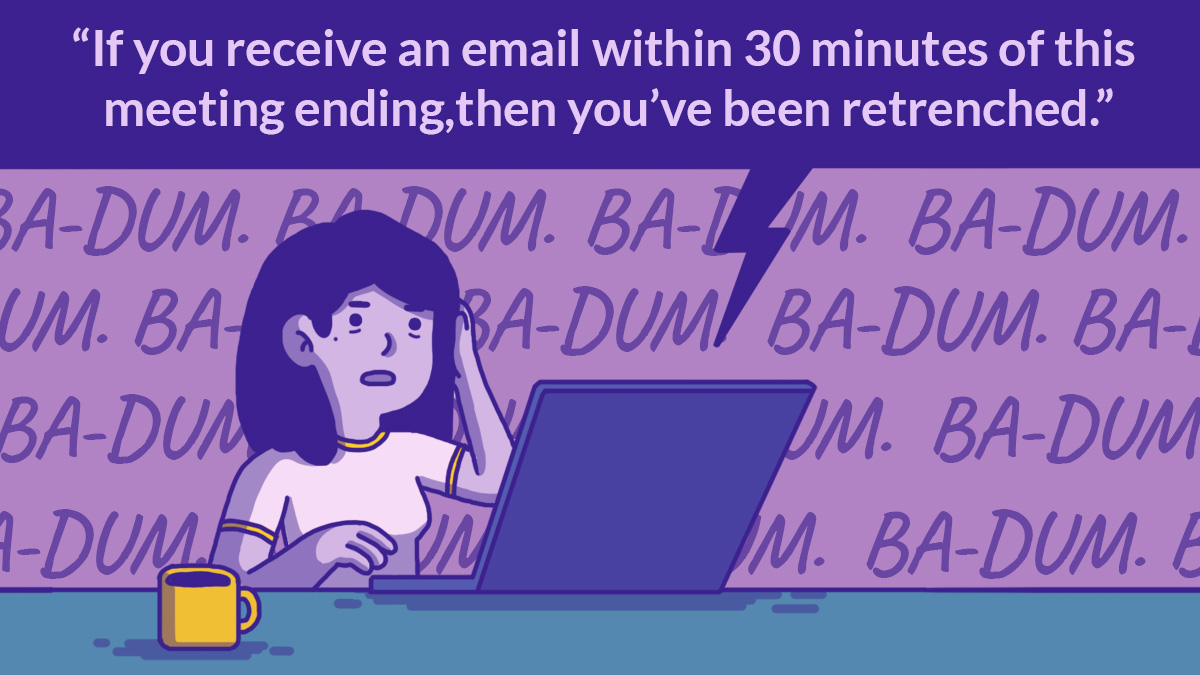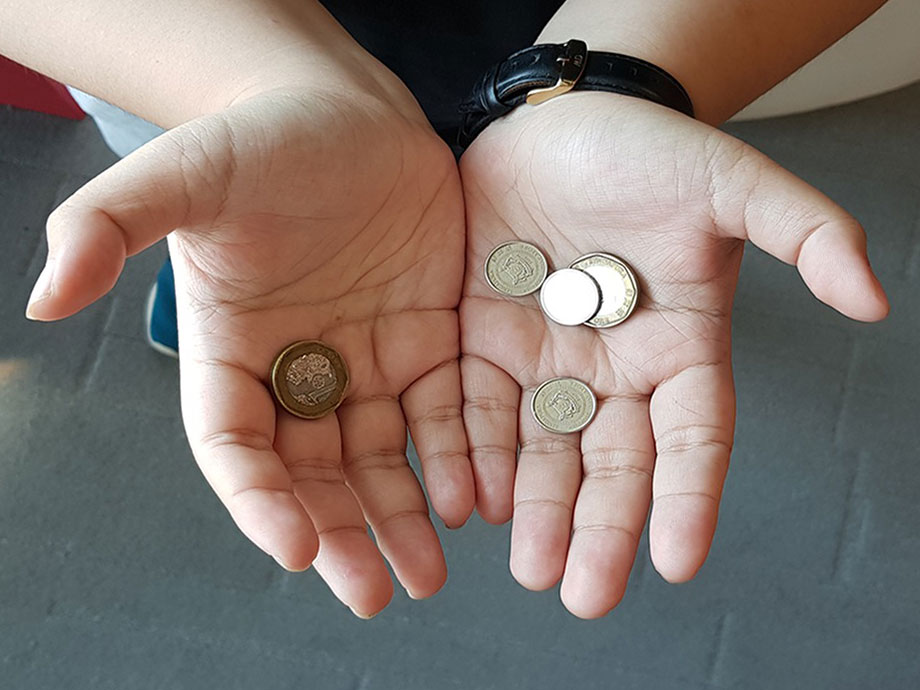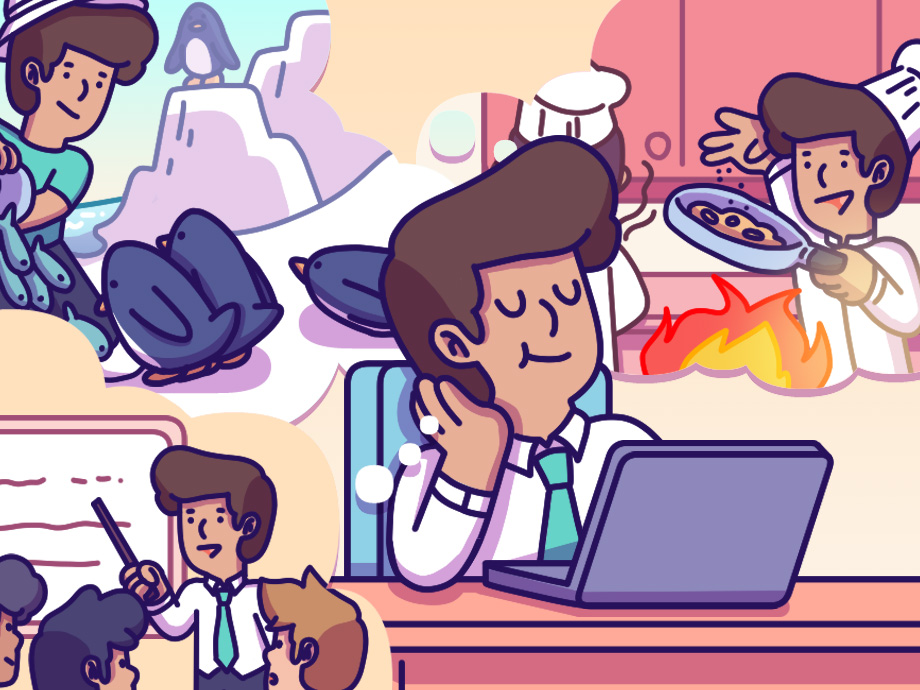Career & Education | Life | Personal Stories | Article
Retrenchment at 25 Taught Me How to Be Kind to Myself
by Sophia | 21 Dec 2020

“If you receive an email within 30 minutes of this meeting ending, then you’ve been retrenched.”
It was a Wednesday morning like any other, and Alyssa (not her real name) was in attendance over Zoom for a company town hall that day. The only difference was that the town hall meeting was about something no one wanted to think about: retrenchment.
The managing director broke the news quickly to all 500 employees that morning, informed them about emails being sent out, and ended the Zoom meeting immediately after.
On her team’s group chat, everyone began to panic. There was barely any time to process the news or even think about whether that might have affected her before Alyssa received a “blank email from HR.”
“It just stated a meeting time but didn’t include anything else,” she recounted to me. “Immediately, I called my manager.”
Alyssa remembered that her manager was quite shocked as well; no one in the company knew who had been picked for retrenchment, both within their own teams and their departments.
The Retrenchment Experience
The town hall meeting had only lasted 20 minutes, at 11:20AM, and Alyssa’s meeting was set for 1PM.
She immediately set off for the office to meet HR in person, where they sat her down and officially broke the news of her retrenchment to her, explained the retrenchment package, how the company would provide assistance, and that her notice period was a month from then.
“The retrenchment package was standard — you get one month of pay based on each year you’ve worked in the company,” she said. “For me, it was only one month’s worth of pay. They let me encash my annual leave too.”
Assistance was provided by the company in the form of linking up those who were retrenched with recruitment agencies and career coaches who would look at CVs and prepare individuals for the job hunt.
The company also engaged a counselling service in light of the pandemic, and allowed retrenched employees to utilise the service “until the end of the year if we needed to.”
Alyssa only had two sessions with her career coach, but still managed to glean good advice at the time. Yet she didn’t immediately get into the job search right away.
“I’m very aware of the job market situation and how competitive things are at the moment,” she said. “I decided that I’d take a break and take some time to think about what really matters to me, career-wise, before jumping into the next opportunity.”
She acknowledged her “relatively fortunate position” to be able to make such a decision, and also because she possesses skills that can easily snag her freelance work, such as videography, designing, and social media marketing.
At the very least, it provided some cash flow, even in the absence of a full-time job — and helped to stave off some of the stress and anxiety she would have felt otherwise.
‘Staying Sane Was Hard’
Alyssa’s initial reaction to getting retrenched was not one of surprise. Her company had been struggling ever since COVID-19 hit, with its physical stores closing down as a result of the pandemic.
She recalled the Straits Times article that published survey findings deeming which jobs were non-essential and felt as though there was a chance her company might also feel the same way.
She added: “I’d witnessed other people get retrenched even pre-COVID, so I knew that being in a relatively new company could mean that you’re easier to let go.”
Post-retrenchment meeting, Alyssa grappled with shock, but attempted to remain positive in spite of everything. To her, at the very least, she didn’t have responsibilities or obligations like paying mortgage or having to raise children.
“But honestly, I was probably just trying to make myself feel better about the shittiness of the situation that was out of my control,” she admitted.
In the days that followed, Alyssa began to “question everything” — including what she was going through. She veered between asking “Why me?” and self-doubt. It was a struggle trying to manage her emotions at work while knowing that her days were numbered.
One ray of light? Her manager kindly offered time off to Alyssa during her last month.
“It helped that my friends were very supportive,” Alyssa said. “People would reach out to ask after me, invite me out for meals, and basically get me out of staying at home so I wouldn’t be stuck in a cycle of my own thoughts.”
It took her some time to get there, but Alyssa eventually accepted that there was no changing her fate — at least with this company. “I could only change what I chose to do with my life moving forward,” she said.
You Are Not Your Work
Today, Alyssa is getting by on freelance projects and gigs that come her way.
She began freelancing relatively quickly, a week after leaving her company, and attributes her success to having supportive and resourceful friends that reached out to their networks to help her out.
On a personal front, she’s experienced a shift in her thinking — especially when it comes to perceiving herself as a working member of society, and how one can derive their self-worth even in the face of something as dreadful as retrenchment.
“The retrenchment changed my perspective on how I viewed myself in connection with a career. I realised that no matter how capable or efficient you are, even with a great attitude, when it comes to big decisions made by people who don’t know you well — they really can just pick anyone,” she said.
“I’ve also learnt not to let others determine my self-worth based on my role or the company I’m working for.”
‘Reach Out For Help’
Alyssa has two pieces of advice for two groups of people: those who are struggling with the job search, and those who were recently retrenched this year.
“For young people struggling to secure a job, my advice would be to reach out to people they know for help and advice. It can be super demoralising if you’ve applied for 50 jobs without getting a single response back, but sometimes it’s also a numbers game,” she says.
“Younger people might have grown up in a culture of independence and so tend to glorify other people’s successes, but actually it’s much easier if we just look out for one another — and way easier to get a job through someone’s recommendation than it is to send in a cold application.”
For those who were recently retrenched:
“Don’t be too hard on yourself. I think your self-esteem gets hit really hard by such a circumstantial situation, but just know that it probably isn’t personal,” she says. “It’s just an unfortunate business decision that you were the victim of. It’s okay to feel shitty for a few weeks — that’s only natural and you shouldn’t force yourself to feel positive for the sake of it.
“Take care of your mental health during this time, surround yourself with people who genuinely care for you, and once you feel better, start reaching out to people in your network. More often than not, people are willing to help. Good luck!”
Alyssa has offered to give further advice and counsel to those who are currently struggling with the job search and retrenchment, and is reachable via DMs on TSS’ Instagram account.
















